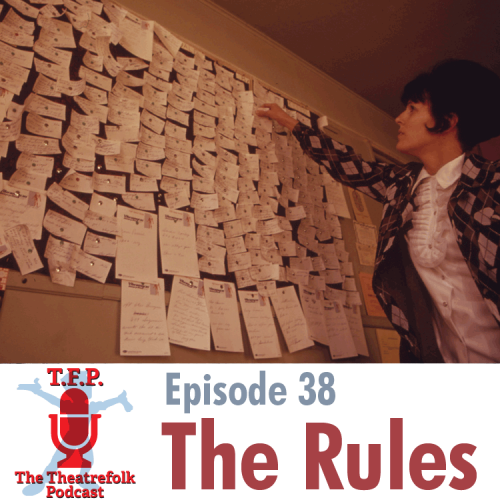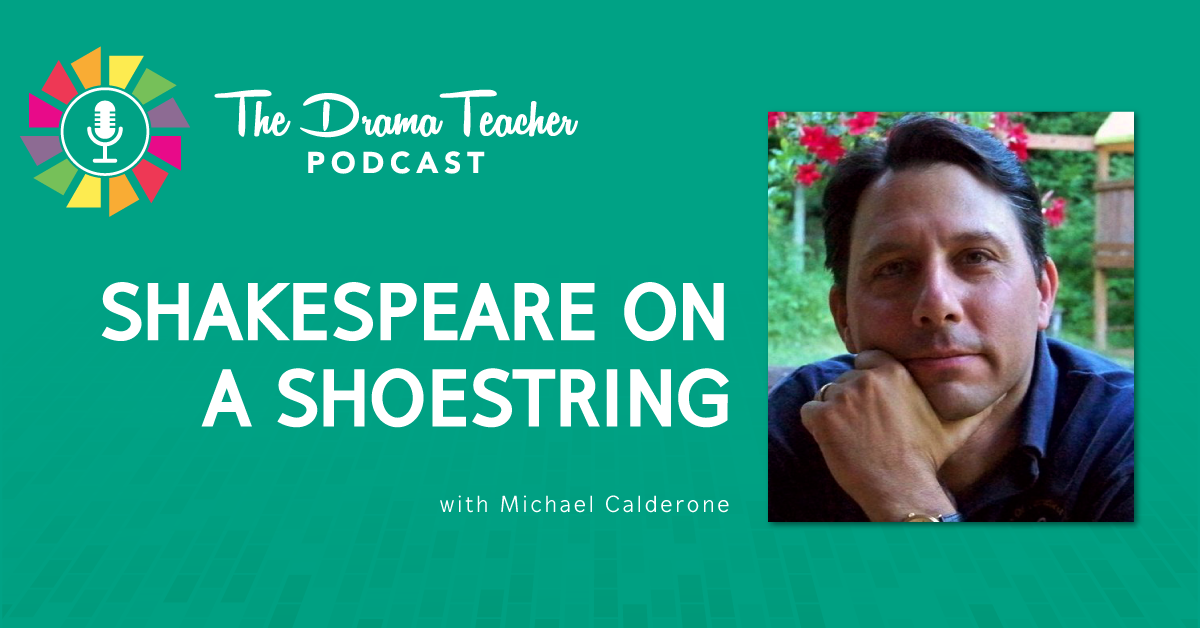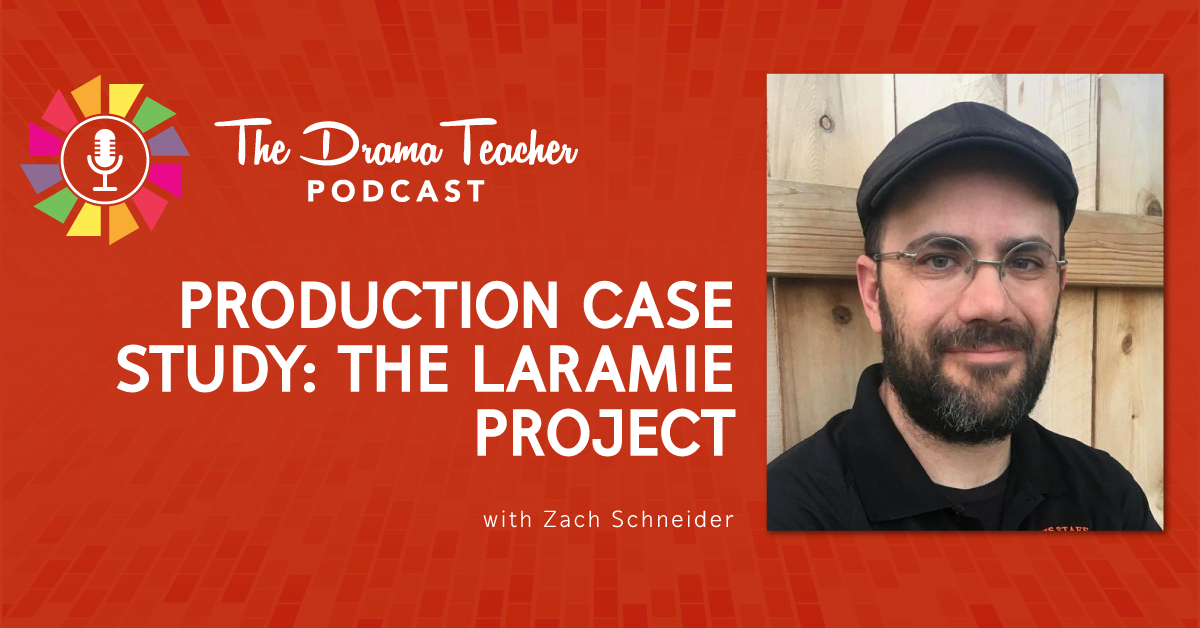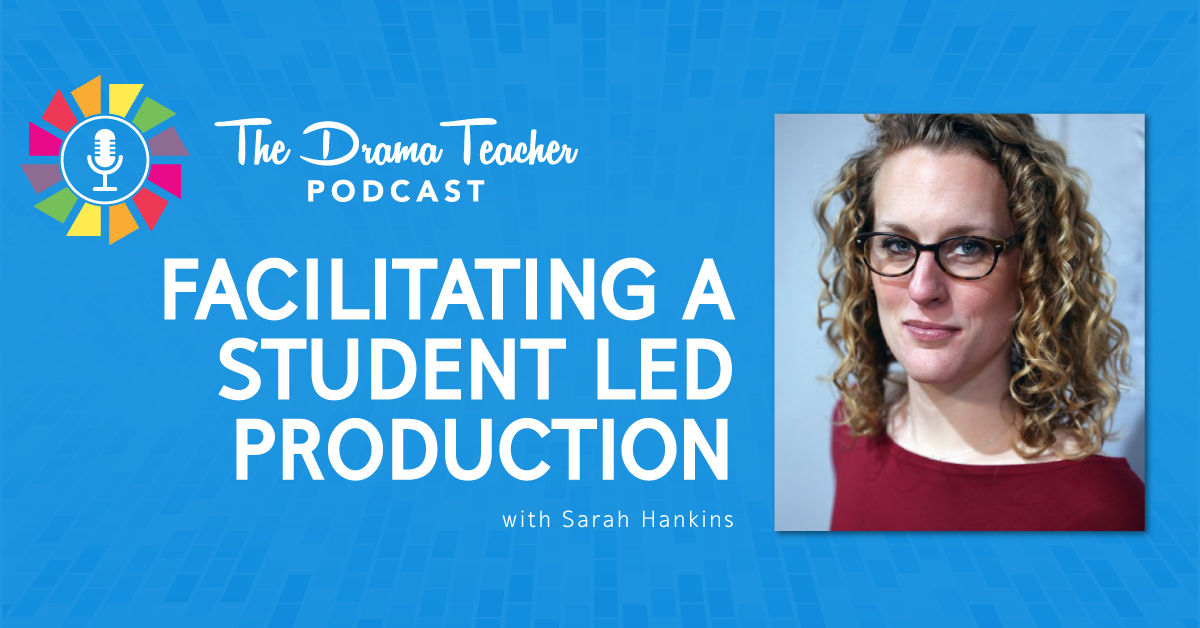The Rules
Episode 38: The Rules
What are the rules an artist needs to follow to get the job done? What are the rules that must be consistently and fiercely broken? Lindsay talks about some of the rules that other writers have shared with the world and what she considers to be her own personal rules for writing.
Show Notes
Subscribe to The Theatrefolk Podcast
Episode Transcript
Welcome to TFP, the Theatrefolk podcast. I am Lindsay Price, resident playwright for Theatrefolk. Hello, I hope you’re well. Thanks for listening.
Today we’re talking rules. But first, let’s do some THEATREFOLK NEWS. Photo call! We want your pictures. If you’ve done one of our plays, we want to see what you’ve done and how you’ve done it. First, I never get to see all of the productions of my plays because they’re flung far and wide and seeing my show in a series of pictures just brings me right into the world of the production. I love it. Also, we want to show you off. We want to showcase your pictures on our blog and on our website. I love seeing how different productions interpret the same play. Further to that, pictures are such a great tool for those who are looking at a script and trying to visualize a certain point if they can read the scene and see that moment in a picture, well that’s like cake and candy all at the same time. So please, please send us your production photos. You can email them to help@theatrefolk.com. Tell us what we’re looking at and let us know that we can use them online.
Lastly, where oh where can you find this podcast? We post new episodes every Wednesday at theatrefolk.com and our Facebook page and Twitter. You can also find us on the stitcher app, AND you can subscribe to TFP on iTunes. All you have to do is search on the word Theatrefolk.
Episode Thirty-Eight: The Rules
I did a blog post recently. I’m doing a lot of blog posts recently because I am stock piling them because I’m going to England and there are no blogging elves that live in my computer and take care of these things. I’m going away. Okay, blogging elves keep things going. See you in two weeks! That would be really lovely. Something I often say and it’s the only thing that I, dislike is not the right word, unsettles me, that gives me tension. It’s the other thing about being self-employed and wishing I had a 9 to 5 job is that if I had one of those, I could leave the job on Friday and not think about it ‘til Monday. And then if I had one of those and I went away, somebody else, that mind of work would cover things. They would be a temp or a substitute or something.
But when you’re self-employed, the only time that work happens is when you do it. And you can really fall into a trap of working all the time. Poor dipole! It’s Sunday and what am I doing? I’m recording a podcast. There really isn’t such a thing as a weekend. But then again, this is not coal mining. It’s not really work, it’s love. And at the heart of it, I know how to get things done so that I’m not falling into the hamster wheel traps of always, always, always working. You just, you don’t think about the big picture about the vast number of things that need to be done. I think about the small picture: one blog post at a time plodding along, one day at a time; one podcast at a time, yes that’s what we’re doing here, right?
So this podcast came out of a blog post that I wrote for the stock pile for England. And it was a post about writer’s rules. Not the golden rule, not the Ten Commandments kind of rule, but a collection of so called guidelines that are good to live by to make writing happen. And that’s really the only reason to have rules, if they’re going to help, if they’re going to guide you forward and make writing happen. Rules that hem you in, that trap you to keep that going, it’s meaningless. So in that particular blog post, stock pile England, I talked about the writing rules for that Kurt Vonnegut, sort of came up with. So we’ll leave that to the blog and look for it and we’re going to look at some rules of some others. So I’ve chosen a couple and we’ll talk about them and as we do try to figure out what my rules are.
Okay, there you go a recap of the podcast. You know what’s coming, no surprises. Well, that will ease the worry and the fraught that I’m sure it’s happening in all of your minds because I am so big on surprises and winging things by the seat of my pants right? New cars for everyone in the audience! There are no new cars, sorry.
So, it was interesting when I was looking around for the rules of writers, tons for novel writers, weigh less for playwrights, although almost everything that the novelist had to say was applicable across the board. I just realized I didn’t look up any rules for poets. Okay so I’m going to rectify that before the end of this podcast. So speak if the podcaster or something.
My favorite rule of the bunch came from and I’m going to apologize now because I know I’m going to butcher this name, Verlyn Klinkenborg. That is a wonderful name and I had no idea who he was, or didn’t even know it was a HE but he is a non-fiction writer and on the editorial board of The New York Times, so shame on me for not knowing who he was. And the rule of his that I like is “Listen to the voices inside your head”. Now he is not talking about the critic’s voice, the voice that tells us that we suck and we’re no good, and it would be better for all the children of the world if we stopped writing, right?
What he’s talking about is it’s the voice of thought. We all have this voice in our head that just sort of “poop!” it pops-up in the unexpected moment of “poop!” just sort of says something to us. The voice that says, “What are those people two doing? I wonder if it’s something illegal. Poop!” That’s the voice of thought. Every single human being has this voice of thought. It’s just whether or not you’re going to choose to A) listen to it or ignore it and B) pluck it out of your head and do something with it. That’s what writers do, we hone in and focus on the voice of thought and make the intangible tangible, if we want to. It’s there in the plucking if you want to hear it and you want to listen to it. You want to sort of sift through and see what’s going to work for you and what’s not.
And also, playwrights you can also take this concept of listening to the voices in your head a step further. And that’s focusing on how words are going to sound once they’re lifted off the page. When I write dialogue, I’m always listening in my head to the characters have conversations, I hear the lines of dialogue as I’m typing or writing. And I just want to… It’s a bizarre type of visualization, “auralization” is that a word? I just made it up or maybe not? I don’t know. But I do this thing so often that it’s at the point now where I’m pretty good at seeing dialogue on the page, hearing it in my head and being to guesstimate what that dialogue is going to sound like when somebody says it out loud. And for a playwright, it’s really a key. It’s key to sound of dialogue is what makes things a play, right? No silent reading in plays and it doesn’t matter what sentences look like, it matters what they sound like.
Next one, Zadie Smith, who I would say is most well-known for her novel White Teeth. And I really liked this one; I think you’ll all know why? “Don’t romanticize your vocation. You can either write good sentences or you can’t. There is no writer’s lifestyle. All that matters is what you leave on the page.” Of course I love this rule. Of course I do. It plays right into my “I’m too practical to be eccentric” galumphing, sullen, why can’t I be like that sort of pout. But it’s true, right? Yes Lindsay, (pat on the head) yes it’s very true. It’s really down to the basics of it, right? You can talk about being a writer or you can make sentences. You can work on making good sentences. You can stand in a garden and smoke a cigarette and wave your scarves around and talk about what is like to be a writer or you could write. You know its worth’s on the page. That is all that matters, words on the page.
If you’re romanticizing what it means to be an artist, you’re probably not working. It’s like a dream world and you cannot work in a dream, the majority of us can’t. I think it’s a great rule in the sense of do your job. Treat it like a job because it’s the greatest job in the whole freaking world. It is the absolute greatest. But you can’t think of it or see it as some kind of room-com where the guys, men and women meet in the middle of the street. There are no cars, no other people. Funnily enough, and a song guaranteed to tug at the heartstrings is playing and they kiss and the camera sweeps away. And everyone lives happily ever after. No, don’t do that. Don’t be the artist who romanticizes what they do.
Elmore Leonard has one that I think is a bit tongue and cheek but I think very appropriate to plays. And this is from his book 10 rules of writing. He says “Never open a book with the weather. The reader is apt to leaf ahead looking for people.” I love that. Yes. Look for the people. I truly believe and I will say this up and down the stairs, up and down the hallways that the best plays are character driven. If there is an issue, a concept, a historical point, an abstraction, it has to be funneled through character reaction, not just that the emotional reaction of the characters. Characters are what the audiences connect to, relate to, and react to. That is what I believe, that is what I’m sticking to so book for the people in your work. Where are they? What are they doing? What are they doing to each other? That is what I think is going to make your work really sing. Because frankly who cares about the weather?
We should probably talk to some playwrights. Arthur Miller once said that “When you can’t create, you can work.” Michael hand in hand with Zadie back there, art is a job, art is work. Don’t romanticize, do the work, do your job, get it done, and remember it is the greatest job on the whole freaking planet. He also says “Don’t be a draft horse. Work with pleasure only.” Which is kind of niche companion, right? So yes we’re like, I’m very much hammering the drum of do you work. Don’t romanticize. Do your work. But it should also be a joy to work. You should love your work. Work with pleasure man like you love what you do. It is so easy to do it. And that’s the key right? We want to find avenues to treat this job the greatest job in the whole freaking world with love and with joy because then all of a sudden, that’s not work. That’s the key.
Neil Simon said this in the New York Times in 1992″If I were to write this play,” I ask myself, “…and fulfill all of its promise on each and every page and carry the play and its characters to their richest potential, just how good a play can this be?” I like this because it’s about giving importance and weight to what you’re doing. Are you really going to spend maybe a year, maybe more and find this work worthwhile? Think that it has value. Value is really important because value is… There’s a lot of value in all kinds of different things. There is value in making people laugh. There’s a value in making people think. It all just depends on what your thing is, right? But thinking that your work has value that yes I am going to spend a year on it and it’s going to be groovy. That is a good rule to live by.
So what about me? And what are my rules? As I’m going through this, funnily enough, one of what I believe has been illustrated in the rules that I’ve chosen here. Interesting how that happens, it’s almost like I’m the one who designed that to happen. Yes, I’m doing evil fingers in front of the microphone that you can’t see. I think every writer should take to heart that there is no one rule that defines what it means to be a writer. What I mean by that is we often get overwhelmed by what other writers do and think that if I’m going to be a writer, if I’m going to be a dancer, if I’m going to be an actor, I have to do what they do. I have to be, at 26, I have done as many plays or I have to done as many movies or I have to be in as many pieces as so and so over there.
And if I’m not, then I’m successful, that I’m failing. Or, that’s just the process of it. There is no one way to complete the process of writing. It’s not good to think that there is a hard fast set rule towards that, that the writer must write eight hours a day; that the writer must write ten pages every day, that the writer must only write serious works, that the writer must, the writer must. What works for writer A, works for writer A and that’s it. You have to determine what works for you. You need your own process. And so to that end, the really, the only rule that the writer must follow is writers write. If you write one word and you write one word every day, you’re a writer. Will it take you a long time to finish something, sure, but so what?
There is no rule that says you have to write seventeen projects in a year. You just have to write. Words on the page; don’t talk about writing, don’t be the romanticized version of a writer. Put words on the page, good words, bad words, ugly words and then rewrite those words and then move them forward. That’s my one rule, writers write, words on the page, every single word counts.
If I had added one more thing, it would be particularly if you are going to send your work out into world, format your work properly. Yes, I’m talking to you texting generation but with your no punctuation and your no capitals and your short-formed spelling for everything. It is not cute. It is not appropriate and yes I know, this makes me sound old. I can live with it. True, if you’re going to send me something, I’m the gatekeeper of the submissions at Theatrefolk. I read all the plays that come in the door and if I have to weigh through formatting issues, it kind of says to me that you don’t care. Whether or not you do, all I have is this work that’s sitting in front of me and I’m not going to pay attention to your content if you haven’t paid to your format. End of the story.
Same thing goes for not sending your proper cover letter, emails you can do a proper cover letter with dear so and so and sincerely so and so at the end. You have to care enough to tell me who you are and what your work is about because otherwise why would I care? I’m going to end this little jaunt through writer’s rule with Margaret Atwood. I love some Margaret Atwood. The Handmaid’s tale is one of my favorites. I know all of her and I find her very hard to watch in interviews. Sometimes, it really comes across to me as kind of totally humorless. We need some humor right? It makes me really sad.
But then I came across these rules that she wrote; her take on the rules of the writer. And I think they’re lovely and very tongue and chic. So, shame on me for being all judgey, judgey about Ms. Margaret Atwood. So here we go one: Take a pencil to write on airplanes. Pens leak. But if the pencil breaks, you can’t sharpen it on the plane because you can’t take knives with you. Therefore, take two pencils. Okay, so I look at this one which I find very, very funny but then my first thought is pencil sharpeners? Okay, don’t judge. See? I’m judgey, very judgey person. Stop that!
Two: take something to write on. Paper is good. In a pinch, pieces of wood or your arm will do. Really, there is no panic. Like not having a piece of paper when you want to write something down, I love this. I’m not going to carry a wood around but the number of times I’ve had to pull out some napkins or so, something, anything.
Three: Do back exercises. Pain is distracting. Love that!
Four: You most likely need a thesaurus, a rudimentary grammar book and a grip on reality. This latter means, there’s no free lunch. Writing is work. It’s also gambling. You don’t get a pension plan. Other people can help a bit but essentially, you’re on your own. Nobody’s making you do this. You chose it, so don’t whine.
Amen Ms. Atwood! It’s not coal mining, right? Do your thing.
And that’s where we’re going to… Ah… ah… ah…! I said I was going to do some poet rules. Okay hold on. I’ll be right back. (Sing the jeopardy theme song in your heads. Go.)
Okay, through the magic of the trim feature I am now, instantly, back with something very funny actually. So these rules are from anti-natural.org. The top of the page says 15 Credibility Street. Head over there as I’m not going to do all of the rules but this is entitled: Rules for the Poets now that anyone can write:
If you use the word ‘soul,’ you will be shot. (I can hear them. I can hear the shots from here.)
Rhymes are appropriate to children’s books and high school creative writing assignments. Formulae are beautiful only in mathematics.
All nights are not endless; all rains not gentle; all skies not azure; and so on and so on.
It is not a poem just because the line ends before the punctuation.
The world does not need another poem about a bad relationship. Save it for the diary.
You would not invite your friends over and serve them rancid food and sour wine. Why not? Because you care about them and you don’t want to see them suffer. Have mercy. Discipline yourself.
And that is where we’re going to end. Take care, my friends. Take care.
Music credit: “Ave” by Alex (feat. Morusque) is licensed under a Creative Commons license.



